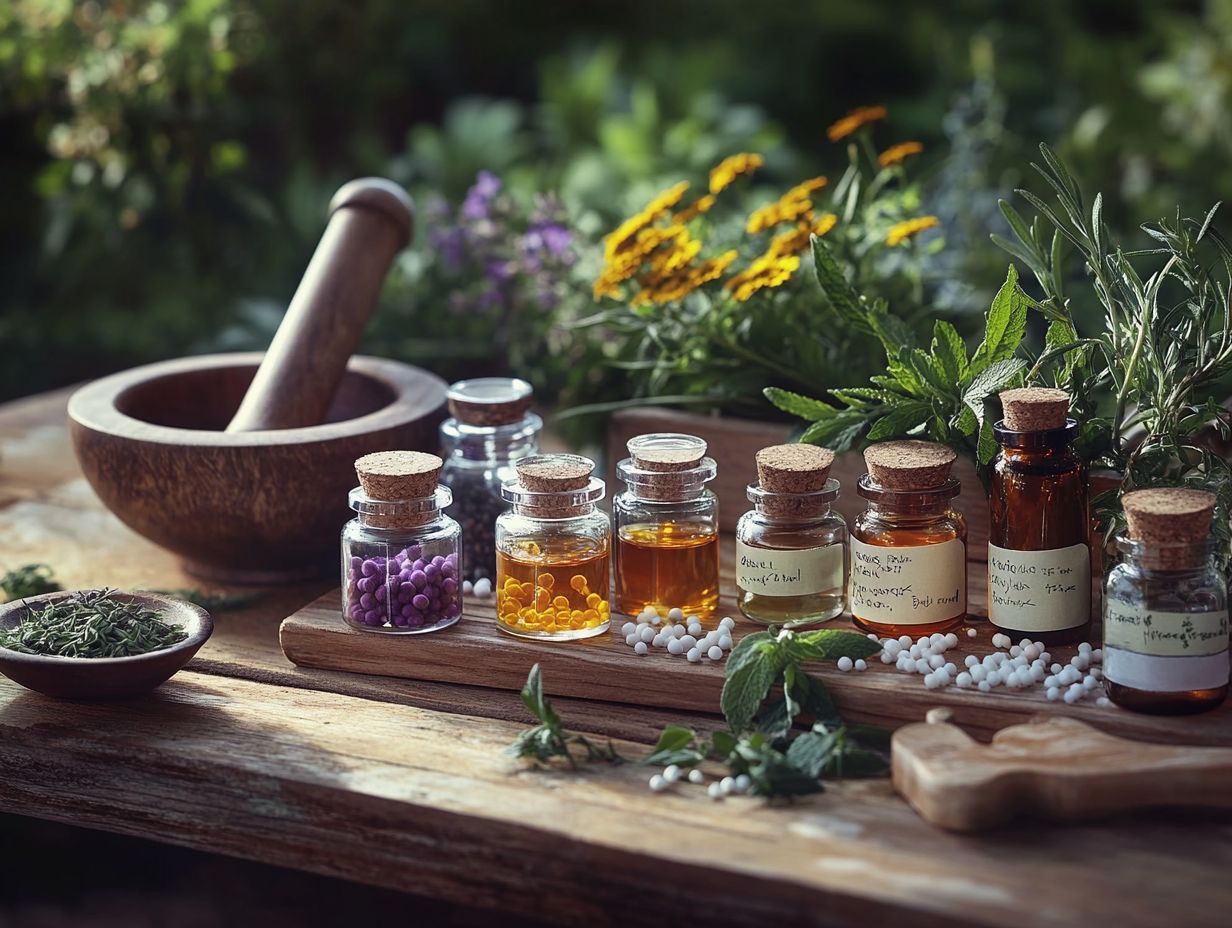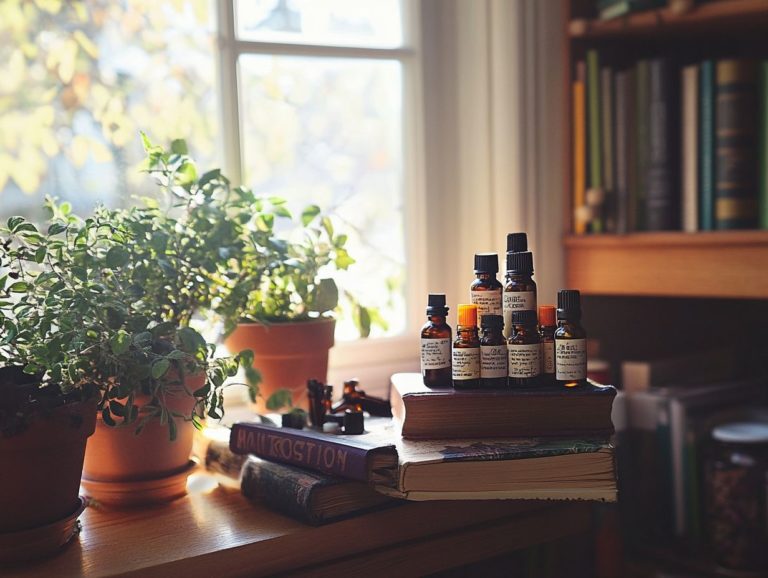5 Lesser-Known Homeopathic Remedies
Homeopathy presents a distinctive approach to healing, focusing on the body’s inherent ability to restore balance. Discover how these remedies can transform your wellness journey!
While you may be acquainted with some popular remedies, there are lesser-known options that hold equal potential for effectiveness.
This article delves into five fascinating homeopathic remedies: Arnica, Nux Vomica, Pulsatilla, Hypericum, and Belladonna.
We will also explore the fundamental principles, preparation methods, and applications of homeopathy for both acute and chronic conditions.
Engage with us as you uncover how to seamlessly integrate these natural treatments into your daily routine.
Contents
Key Takeaways:

Arnica can be used to reduce swelling, bruising, and pain associated with injuries and surgery.
Nux Vomica can help with digestive issues, hangovers, and stress-related symptoms.
Pulsatilla is useful for respiratory issues, menstrual cramps, and emotional imbalances.
1. Arnica
Arnica, or Arnica montana if you want to sound elegant, is a celebrated homeopathic remedy that you ll want to have on hand for treating bruises, muscle pain, and inflammation.
It has become a staple in homeopathic pharmacies and among practitioners, thanks to its impressive healing properties.
Numerous medical studies support its effectiveness, and it even has a place in the German Homeopathic Pharmacopoeia, highlighting its rich history in herbal medicine and alternative treatments.
This versatile herb works wonders through its anti-inflammatory and analgesic effects, helping to speed up your body’s natural healing processes in acute situations like sports injuries, sprains, and recovery after surgery.
You will find that homeopathic preparations often dilute the active ingredients, amplifying their benefits while minimizing side effects, making it a favorite among athletes.
Notable figures such as tennis sensation Novak Djokovic and football icon David Beckham have praised its remarkable ability to enhance recovery and alleviate pain.
As these elite athletes credit Arnica for its positive effects, many everyday users like you are discovering this natural remedy for quick relief.
2. Nux Vomica
Nux Vomica, extracted from the seeds of the Strychnos nux-vomica tree, stands out as a distinguished homeopathic remedy known for addressing a variety of health concerns, particularly those related to digestive issues and the repercussions of lifestyle choices like excess, stress, and sleep disturbances.
You will often find this remedy recommended during homeopathic consultations, aimed at helping you regain balance and well-being.
If you are dealing with symptoms like nausea, irritability, and headaches from overeating or drinking, Nux Vomica can be an essential ally in restoring harmony in your body.
A particularly interesting aspect is the careful dilution process this remedy undergoes, which involves repeated steps of dilution and shaking, enhancing its efficacy while eliminating the toxicity of the original substance.
Homeopaths frequently advocate for self-prescribing at home, encouraging you to start with a low potency to gauge your response, gently guiding you back to balance.
By educating yourself on the proper use of this remedy, you can effectively manage mild ailments that come with the hustle and bustle of modern life.
3. Pulsatilla
Pulsatilla, derivada de la elegante flor Pulsatilla nigricans, se presenta como un remedio homeop tico til, especialmente para la salud femenina. A menudo se emplea para problemas como desequilibrios hormonales y alteraciones emocionales.
Este remedio es popular en las consultas homeop ticas. Es conocido por su suavidad y efectividad para restaurar el equilibrio emocional.
La planta, conocida como an mona, prospera en diversos climas y muestra la resiliencia de la naturaleza. Se utiliza para irregularidades menstruales, s ntomas de la menopausia y ansiedad durante estas transiciones vitales.
Su enfoque hol stico no solo abarca dolencias f sicas, sino que tambi n nutre el bienestar emocional, promoviendo armon a interior. Pulsatilla estimula los procesos naturales de curaci n, empoder ndote para recuperar el equilibrio y mejorar tu calidad de vida.
Los home patas enfatizan la adaptabilidad de este remedio a las necesidades individuales, convirti ndolo en una opci n confiable para soluciones de salud alternativas.
4. Hypericum

Hypericum, tambi n conocido como hierba de San Juan, es un notable remedio homeop tico. Se destaca por su capacidad para tratar lesiones nerviosas y traumas.
This remedy relieves pain and promotes recovery from acute conditions. Its historical applications include healing wounds and easing the emotional aftermath of trauma.
Home patas utilizan un meticuloso proceso de diluci n y shaking. Este proceso mejora sus cualidades terap uticas y garantiza la seguridad.
Preparaciones comunes incluyen tinturas o gr nulos homeop ticos, disponibles en diversas potencias. El m todo de preparaci n influye en la efectividad del remedio para tratar problemas espec ficos.
5. Belladonna
Belladonna, derived from the plant Atropa belladonna, stands out as a powerful homeopathic remedy. It is frequently used to manage acute conditions like fevers, inflammation, and spasms.
This remedy is particularly valued for its ability to reduce high fevers, often characterized by flushed skin and sensitivity to light. It supports the body’s natural cooling mechanisms.
While Belladonna offers significant benefits, it’s important to use it carefully. Misuse can lead to side effects like dry mouth, blurred vision, or confusion.
Proper guidance is essential to unleash Belladonna’s potential in homeopathic treatments.
What Is Homeopathy and How Does It Work?
Homeopathy is an alternative medical system designed to treat individuals using highly diluted substances. Its aim is to activate the body s inherent healing abilities. Founded by Samuel Hahnemann, this approach emphasizes personalized treatment, rooted in the belief that “like cures like.” This principle can make it particularly effective for various chronic illnesses and health conditions. Many outcomes are influenced by the placebo effect.
Originating in late 18th century Germany, homeopathy emerged when traditional medical practices often lacked scientific credibility. Over the years, it has transformed into a recognized therapeutic approach. Skilled practitioners conduct thorough consultations to evaluate your unique symptoms and overall constitution.
This personalized focus is vital. Homeopathic remedies are carefully crafted to elicit a healing response, thereby enhancing their effectiveness.
Many individuals seeking holistic care turn to homeopathy as a complementary option. They often report positive results and an improved quality of life.
What Are the Key Principles of Homeopathy?
The key principles of homeopathy center around foundational ideas established by Samuel Hahnemann. These include the law of similars, the concept of making remedies stronger, and the emphasis on treating the whole individual rather than merely addressing symptoms.
This approach positions homeopathy as a credible alternative for various health issues.
By focusing on your unique symptoms and overall well-being, homeopathic practitioners can customize remedies. These remedies target not just your immediate discomfort but also the underlying factors impacting your health.
For instance, a remedy like Arnica montana might be recommended for bruises and trauma. This perfectly illustrates the law of similars, where a substance that induces symptoms in a healthy person alleviates similar symptoms in someone unwell.
The process of making remedies stronger involves diluting and vigorously shaking the remedy. This enhances its healing properties while minimizing potential side effects.
This holistic approach addresses physical ailments and nurtures emotional and mental well-being. It showcases how these principles effectively guide the practice of homeopathy.
How Are Homeopathic Remedies Made?

Homeopathic remedies are crafted with utmost precision. They employ a rigorous dilution process that involves serial dilutions and succussion, which is the process of shaking the mixture. This meticulous method ensures that the final product retains the therapeutic properties of the original substance while minimizing potential side effects.
It’s a process recognized and regulated under FDA oversight in certain regions. This careful preparation amplifies the efficacy of the remedies and underscores the importance of each dilution step.
With every dilution and succussion, the homeopath is imprinting the energetic pattern of the original material onto a carrier solution, typically water or alcohol.
Quality control plays a crucial role in homeopathic pharmacies. Each batch is held to strict standards of potency and purity. By adhering to high-quality processes, these pharmacies ensure that you receive remedies that are safe, effective, and tailored to your individual needs. This fosters a deep sense of trust in the homeopathic approach.
Can Homeopathy Be Used for Acute and Chronic Conditions?
Homeopathy is a powerful tool you can effectively utilize for both acute and chronic conditions. It offers a holistic approach that tailors remedies to your unique symptoms and health history. This personalization enhances treatment efficacy and promotes your overall well-being.
For instance, in acute scenarios like a sudden cold or flu, practitioners often recommend quick-acting remedies. These are designed to alleviate your immediate discomfort and restore balance swiftly.
Chronic conditions such as asthma or eczema demand a more nuanced assessment. Practitioners consider your long-term health patterns and emotional state. They conduct thorough evaluations and engage in detailed discussions about your lifestyle, diet, and previous medical history.
This meticulous approach enables them to create personalized treatment plans that encompass both acute interventions and long-term support. It fosters healing while preventing future occurrences.
Ready to experience the transformative power of homeopathy? Find a practitioner near you!
What Are the Possible Side Effects of Homeopathic Remedies?
Homeopathic remedies are typically regarded as safe and free from severe side effects, thanks to their highly diluted formulations. However, you might encounter mild reactions or notice a lack of improvement. This underscores the significance of understanding the placebo effect, which is when a person feels better simply because they believe they are receiving treatment, even if the treatment has no active ingredients.
Reactions can differ widely from person to person. Monitor how you feel after starting a new homeopathic treatment.
While mild symptoms are rare, they can occasionally surface. If you notice any side effects, don’t hesitate to reach out to a qualified homeopathic practitioner. If you’re seeking treatment, feel empowered to ask questions about potential outcomes, ensuring that your concerns are fully addressed.
Remember that a professional can offer individual advice on managing any unexpected reactions, further enriching your experience with homeopathic care.
How Can One Incorporate Homeopathy into Their Daily Life?
Incorporating homeopathy into your life can help manage health issues. You can self-prescribe remedies that suit your symptoms while deepening your understanding of your overall well-being.
To seamlessly integrate this approach into your routine, consider visiting health food stores, where a diverse array of homeopathic products awaits. These shops often stock well-known remedies for common ailments, making it easier for someone new to homeopathy to discover suitable options.
It s also wise to maintain a journal to track your symptoms and the remedies you’ve tried. This practice can prove invaluable when consulting with a homeopathic practitioner.
Engaging in open dialogue with these experts ensures that your self-prescribing efforts align with effective practices, allowing you to enhance your personalized health management journey.
Frequently Asked Questions

What are the 5 lesser-known homeopathic remedies?
Curious about lesser-known homeopathic remedies? Here are five you should know: Apis mellifica, Ipecacuanha, Natrum muriaticum, Psorinum, and Thuja occidentalis. For more insights, check out the 5 most popular homeopathic remedies explored.
How does Apis mellifica help in homeopathy?
Apis mellifica is derived from the honeybee and is commonly used for treating bee stings, insect bites, and hives. It also effectively treats urinary tract infections, swollen glands, and sore throats.
What conditions can be treated with Ipecacuanha?
Ipecacuanha is an effective homeopathic remedy for nausea, vomiting, and diarrhea. It can also be used for respiratory problems, such as bronchitis, asthma, and coughs.
What is the role of Natrum muriaticum in homeopathy?
Natrum muriaticum is commonly used for treating emotional issues such as grief, depression, and anxiety. It also effectively treats headaches, cold sores, and digestive disorders.
How can Psorinum help in homeopathic treatment?
Psorinum is derived from scabies and is used in homeopathy for treating skin conditions such as eczema, psoriasis, and itching. It is also effective in treating respiratory problems, digestive disorders, and fatigue.
What is the recommended dosage for Thuja occidentalis?
The recommended dosage for Thuja occidentalis depends on the specific condition and severity of symptoms. It is important to consult with a homeopathic practitioner for the appropriate dosage and frequency of this remedy.






